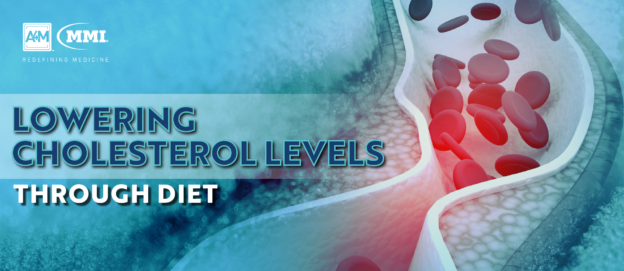Maintaining healthy cholesterol levels can greatly reduce the risk of cardiovascular disease development and stroke while promoting heart health. According to current guidelines for blood cholesterol management, adults should have a total cholesterol reading of less than 200 mg/dL however, many individuals struggle with high levels of triglycerides and low levels of HDL putting them at risk for heart disease.
For some, lowering cholesterol levels requires a multifactorial approach comprised of medication, weight management, physical activity, and nutritional restrictions. Other individuals with elevated cholesterol levels may benefit from simple dietary changes such as reducing animal protein intake and increasing vegetable consumption, which can lower total cholesterol by 25% or more.
As recommended by Harvard Health Publishing, the following four steps may help lower cholesterol levels through nutritional intervention:
Consume Unsaturated Fats, Avoid Saturated and Trans Fats
Consuming heart healthy vegetable fats and oils comprised of unsaturated fats can have a significant impact on cholesterol levels. Patients can benefit by incorporating more foods such as oily fish, nuts, seeds, and unsaturated oils into their diet as well as avoiding saturated and trans fats.
Reducing amounts of saturated and trans fat has shown the potential to reduce cholesterol by 5% to 10%. Certain meats, dairy products, baked goods, and processed foods are rich in saturated fat, which raises LDL cholesterol. Any foods made with partially hydrogenated oils and fats can also raise LDL levels while lowering HDL, due to their trans-fat content.
Eat More Soluble Fiber
Soluble fiber has been found to reduce low-density lipoprotein cholesterol by reducing its absorption into the bloodstream. Five to 10 grams of soluble fiber consumed daily can have a beneficial effect on LDL levels – one serving of whole-grain cereal can provide up to 4 grams of fiber. Other fiber-rich foods include kidney beans and other legumes, brussels sprouts, apples, bananas, and other fruits.
Incorporate Plant Sterols and Stanols
Research indicates that plant stanol esters can help block cholesterol absorption and three daily servings may be enough to lower cholesterol by 20 points. Naturally occurring in many grains, vegetables, fruits, legumes, and seeds, plant sterols and stanols are similar in structure to cholesterol which allows them to limit the amount of absorbed cholesterol. Due to their powerful cholesterol-lowering qualities, sterols and stanols are increasingly being added to a number of food products such as margarine spreads, juices, and yogurts.
Develop a Personalized Diet
Genetic and physiological differences are important factors to consider when adhering to a new nutritional plan or making dietary changes. There is no universal dietary plan that has the same applicable benefits for all individuals, however, patients should be encouraged to develop their own personalized cholesterol lowering diets rich in healthy fats, whole grains, and plant-based proteins.
Simple dietary changes can have a powerful impact on patient cholesterol levels however, in some cases cholesterol lowering medications may still be necessary. Maintaining a healthy diet filled with unsaturated fats, soluble fiber, as well as plant sterols and stanols, has the potential to reduce the dosage of needed medication while promoting overall physical and mental health.

